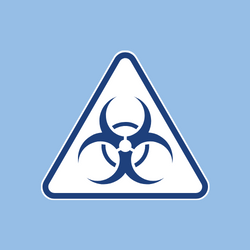
Office for Research Protections | Biosafety
February 27, 2024
Following the detection of a case of poliovirus in New York in July 2022, the U.S. National Authority for Containment of Poliovirus (NAC), part of the CDC, has developed resources “to help reduce the risk of polioviruses being released from the places where they are worked with or stored.”
At Penn State, researchers are required to review whether any of the materials they work with are potentially infectious. Potentially infectious materials include:
- Polio stocks
- Stool or respiratory specimens (collected in the USA, 1966-2000)
- Sewage or water specimens (collected in the USA, 1966-2000)
- Similar materials from outside the USA (anytime)
- Materials saved from animal or cell culture inoculations with any of the items from questions 1-4 (cell extracts, nucleic acids, etc.)
Researchers using or storing any of these materials must report this to orp-biosafety@psu.edu. The Office for Research Protections will work with the researcher to report the materials to the NAC. Researchers can learn more about NAC and access the poliovirus containment toolbox at https://absa.org/topic/polio/.
